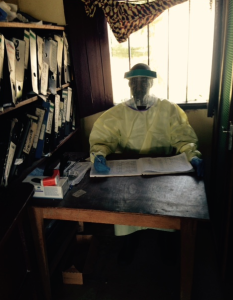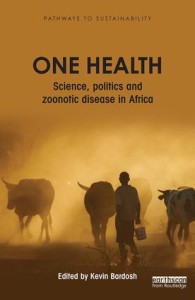Human relationships are the unquantifiable that must be accounted for in global health according to the editor of a new STEPS book on One Health.
“We are destroying the planet, and becoming caged rats or dogs. At some point we are going to start eating our young [laughs]… But really, some virus is going to come along and kill half of us soon. You can say what you want about science and human knowledge and preparing… this is biological law… the politicians can’t even tie their shoes, let alone prevent this from happening”
– Taxi driver, Florida, 2016

Not surprisingly, the above (sobering) quote is a relatively common line of reasoning I encounter when people ask me what I do.
Being an anthropologist and political scientist engaged in the world of pandemic threats, poverty and zoonotic infections (those passed from livestock and wildlife to people), some apocalyptic thinking comes with the job. It explains our cultural obsession with popular movies like the film Contagion” (and the fun strategy game Epidemic.
Global health
While we might enjoy the entertainment, in real life people prefer their experts to be optimists – which, fortunately, characterises most of us working in the world of global health, even when working in very adverse and trying circumstances. We rally around policy changes that presuppose that humans can, as a species, manage our relationship to emerging and deadly new pathogens. We don’t like the language of doom and gloom.
But with each new global infectious disease crisis – from avian influenza to Ebola and now Zika virus – a series of frustrating social and political bottlenecks have followed. Uncertainties have tended to fuel delayed response; our knowledge to play catch-up to the pathological spread of the latest deadly enemy.
Our ability to mobilise, communicate, manage and fight is also fragmented. We are prone to infighting and delay.
After the death toll, there is a sense that (like the taxi driver) we better get things right next time… . A cycle of debate, blame and reflection follows, often in a series of expert reports and high-level commissions. Since the recent Ebola epidemic, there have been at least six high-level reports detailing what needs to change.
Cultural brokering
All of which leads me to reflect on a plane trip back from Kenya, on which I happened to sit next to a fellow anthropologist from the United States. Both reeling from jet lag, we started up a conversation. He had also recently been in Africa, and like myself was also a ‘cultural broker’, mediating the cultural and disciplinary worlds in international development.
This man was part of a large flagship project advising African governments on how to address the adverse impacts of climate change. Prominent US and European climate scientists and engineers had presented a series of sophisticated computer and economic models and outlined bold new plans for a range of major mitigation interventions and policy changes. This would save catastrophe, the reasoning went.
It was all very reminiscent of our pandemic disease action plans
The costs were also calculated: cheaper to mitigate than deal with future adverse consequences – again, a common maxim in global health.
But while African policymakers were courteous, they were also dismissive. They had no use for these models. They knew the recommendations already. It was nothing new. And the models offered no practical guidance whatsoever.
It was the classic case: westerners had neglected to take account of the political spaces that African decision-makers operated in, and never asked what information or action could help them navigate these arenas.
Gaps in communication
I tell this tale because it is a story I have witnessed first-hand many times. The more I engage between the worlds of research and policy in the field of epidemic preparedness and response, the more apparent the gaps in communication between different social groups – between disciplines, sectors, agencies, cultures and class – and, importantly, between research and action, have become to me.
 At the heart of the challenge are major institutional and organisational bottlenecks, infused with power dynamics, political patronage and historical and cultural baggage. This is the subject of a new book I have edited, One Health: Science, Politics and Zoonotic Disease in Africa, launched at One Health for the Real World: zoonoses, ecosystems and wellbeing.
At the heart of the challenge are major institutional and organisational bottlenecks, infused with power dynamics, political patronage and historical and cultural baggage. This is the subject of a new book I have edited, One Health: Science, Politics and Zoonotic Disease in Africa, launched at One Health for the Real World: zoonoses, ecosystems and wellbeing.
Going one layer deeper, we encounter the challenge of being human. Even in a household (think of your own family) we are all very different: different views, looks, personalities, interests and influences.
It is this all-too-human diversity that is compounded in a globalised world where we aim to create global systems to deal with global threats and challenges. These are personal struggles that we endure as a species. My previous work on zoonotic disease – from sleeping sickness in Uganda, cysticercosis in Laos, rabies in Tanzania and others – has shown that many of the problems of policy and intervention are an issue of project management, of politics, of human relationships.
Perhaps some of the language we use – what we can call ‘global health speak’ – has boxed our thinking. We leave behind our intimate knowledge of human relationships while we take up the role of global disease detective, mathematical modeller or even anthropologist.
But this work is actually rather intimate work. If we are truly going to enact the difficult political decisions needed to drive our lofty rhetoric into reality, we need to build better, stronger and more durable relationships – across disciplines, sectors, cultures and social classes.
To bring the point home: like any marriage or friendship, this will require time, investment, respect and the ability to listen. Speaking more clearly about these relational dynamics is paramount, as we go forward into an uncertain future.
Dr. Kevin Bardosh is a member of the Dynamic Drivers of Disease in Africa Consortium and a Research Scholar at the Division of Infection and Pathway Medicine, University of Edinburgh, and the Emerging Pathogens Institute, University of Florida. He currently runs an environmental health project in Haiti and is editor of the newly published book, One Health: Science, Politics and Zoonotic Disease in Africa (Taylor and Francis, 2016). He will be joining the Institute of Development Studies as a research fellow later this year.